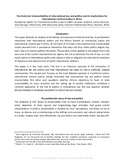The historical irreconcilability of international law and politics and its implications for international criminal justice in Africa

View/
Date
2016-07Author
Sipalla, Humphrey
Stormes, James
Opongo, Elias
Knox, Peter
Wansamo, Kifle
Metadata
Show full item recordAbstract
This paper attempts an analysis of the history and purposes of international law, its problematic
interaction with international politics and the effects thereof on transitional justice and
international criminal law in Africa. At the heart of its thesis is the assertion that irreconcilable
results proceed from a paradoxical interaction that plays out thus: while politics begets law,
law’s role is to restrain political discretion. This paradox is then applied to the subject that is the
very core of the current international law regime, the aim to eliminate the role of war as a last
resort option in international politics and replace it with an obligation to seek judicial resolution
of disputes as the ultimate form of pacific international relations.
This paper is in two main parts. The first is an historical overview of the interaction of
international law and politics and how international law views its role in politically charged
controversies. The second part focuses on the most debated question in transitional justice:
international criminal justice. Having concluded that international law and politics remain
irreconcilable, this latter part questions whether African objections to head of state
accountability for mass atrocities and the setting up of parallel institutions constitute a
coherent application of the role of politics in international law. We also question whether
African attempts to inversely use politics to restrict law can succeed.
